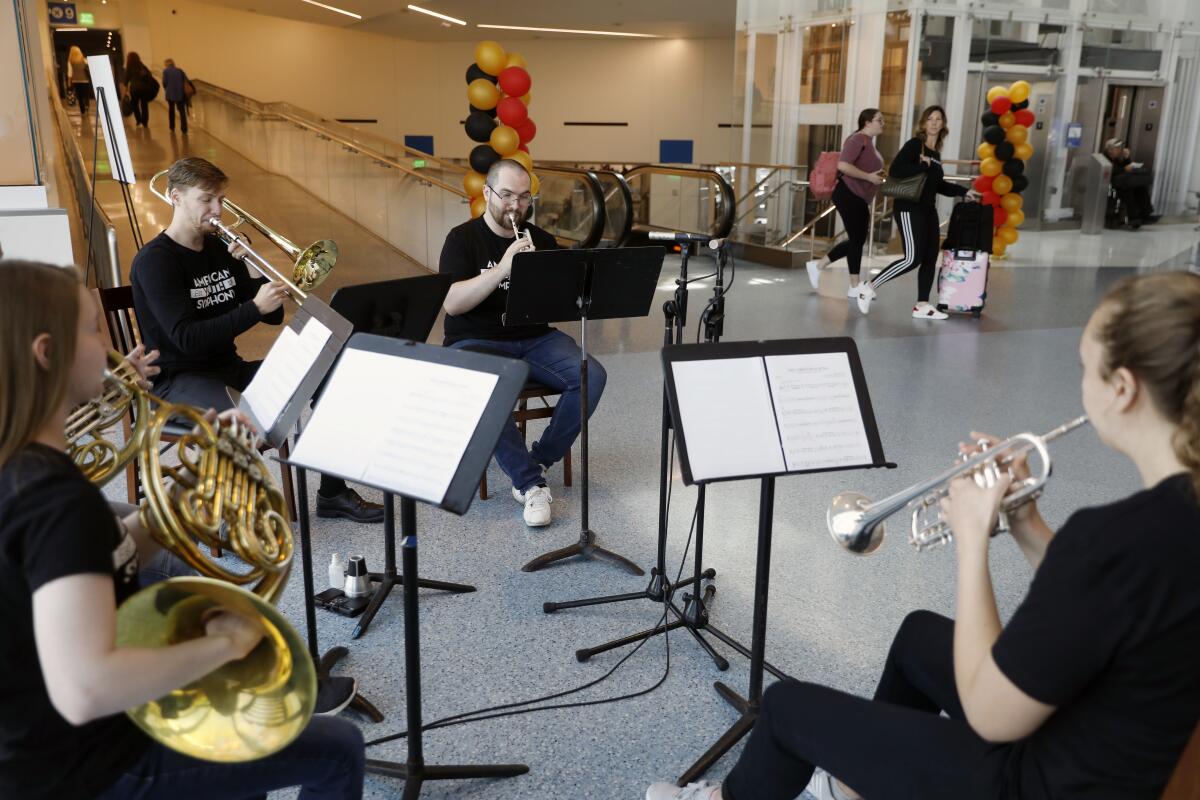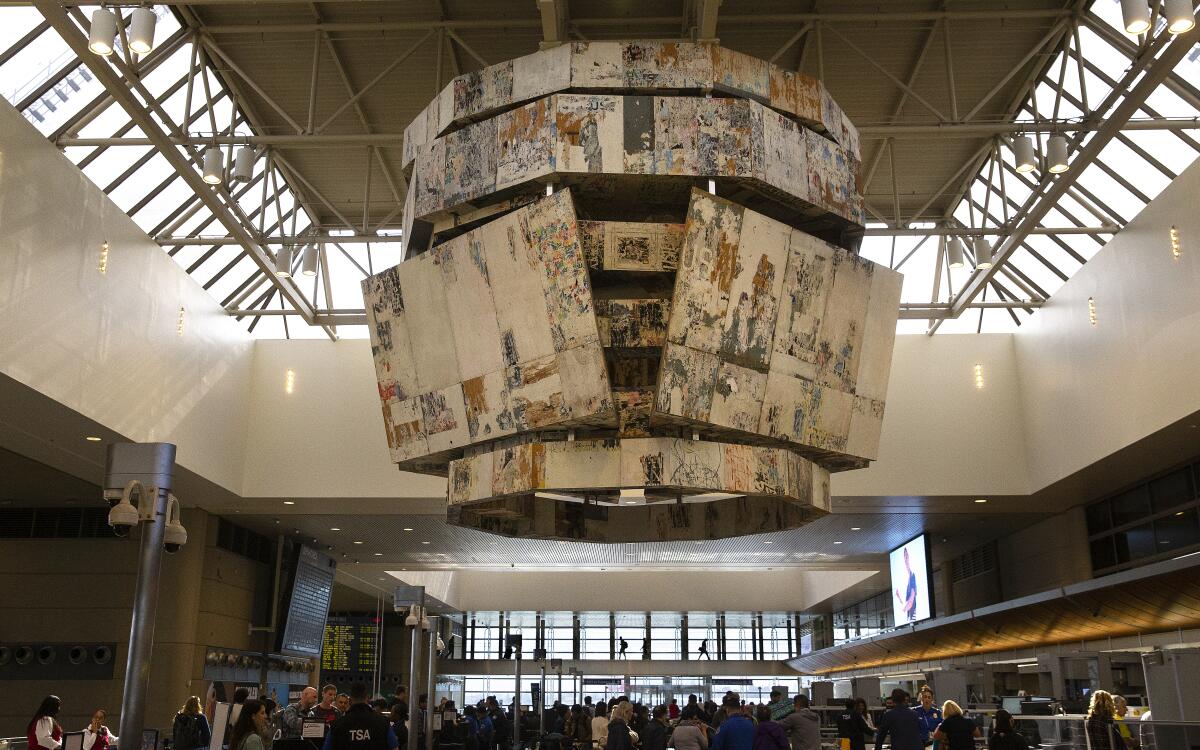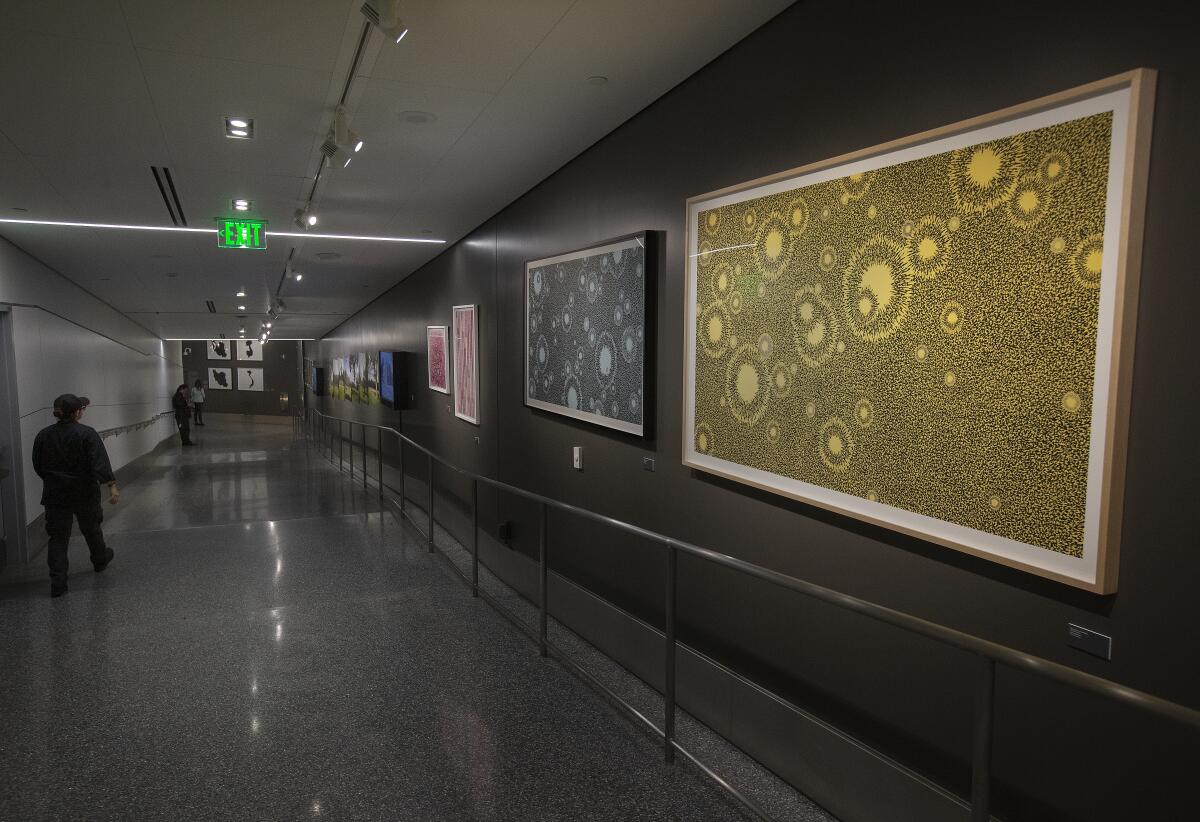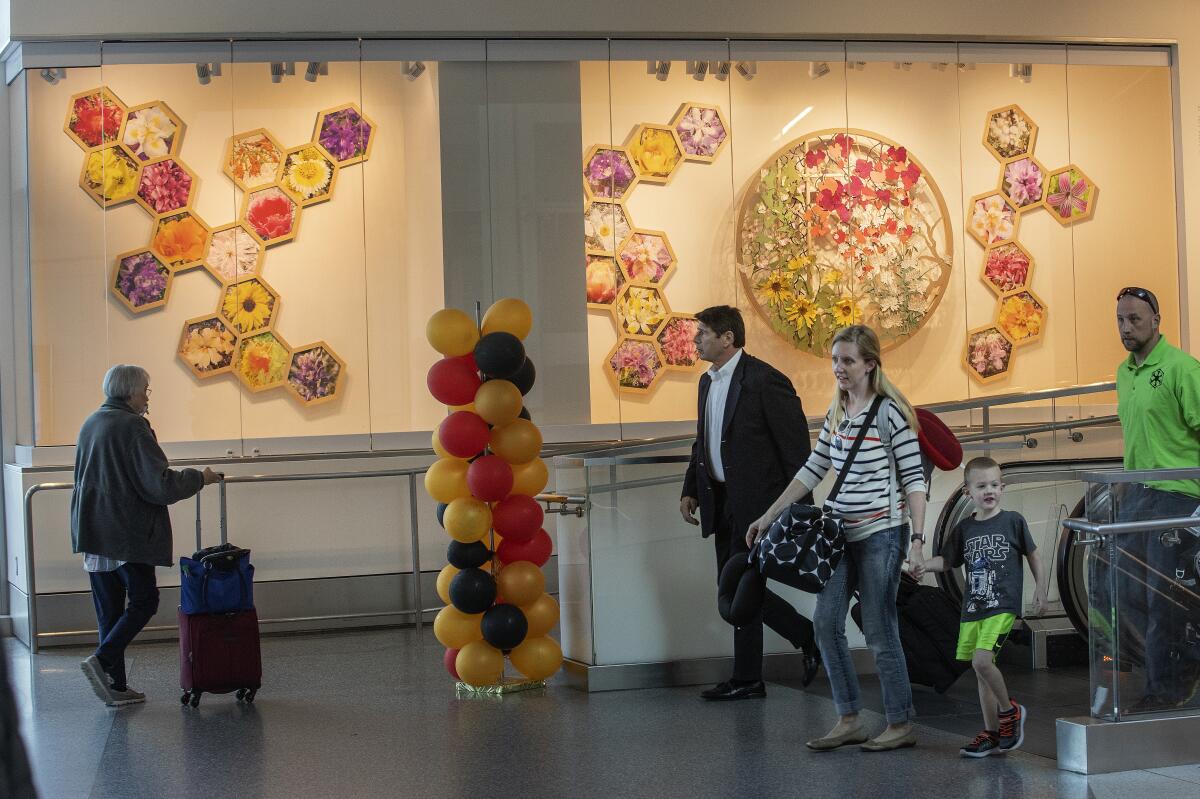Stuck at the airport and stressed? LAX has an artful cure

A five-piece brass ensemble from a local performing arts school on a recent afternoon played a selection of holiday pieces, culminating with the inspirational “Gloria in Excelsis Deo.”
The rich tones mixed with the sounds of travelers rolling luggage along the shiny tiled floor. The concert venue: Los Angeles International Airport Terminal 1.
“Performing at an airport is exactly that,” Valerie Ankeney, the French horn player, said from a makeshift stage between gates 8 and 9. “If people want to listen or if people want to pass by, they still hear the music. It brightens their day.”
Many travelers stuck in a crowded airport could use having their day brightened. The stress inherent in the modern travel experience already has pushed airports to relieve passenger stress with upgraded food, beverage and retail selections, additions that also bring in airport revenue.
There is scant proof that adding musical performances or art exhibits to an airport makes it easier to navigate or more profitable. But that hasn’t stopped LAX and other airports across the country from setting aside space for the arts in areas normally reserved for passenger waiting areas or shops, eateries and bars (the old-school method of relieving stress).
The makeshift stage near the escalator is one of seven areas at LAX that have hosted a 10-month concert series including performances of rock, jazz, mariachi music and folk-punk fusion, plus a violin player who played while a Japanese artist in a top hat painted calligraphy on a large white canvas.
In addition to the concerts, LAX has eight sites for temporary exhibits and several permanent displays, including a 12,500-pound sculpture that resembles a giant arena Jumbotron and hangs over a busy security screening area. All of the musicians and artists featured at LAX are based in Los Angeles.

Airport operators say injecting an airport that serves 87 million people a year with art, music and dance performances reduces passenger stress and gives travelers a better sense of the local culture — even if it’s not clear that fliers are actually noticing the art and music.
“We think it creates a welcoming environment for the passengers,” said Sarah Cifarelli, manager of the LAX arts program.
A survey of 3,800 LAX passengers last year found that 92% either agree or strongly agree that the arts program improved their travel experience, according to airport officials.
LAX is not alone in trying to add pizzazz and culture to otherwise stale airport terminals.
San Diego International Airport operates what may be the nation’s only airport with a performing arts residency program, which is currently hosting a theater company. The residency program last year hosted a group of aerial dancers who performed from ropes and trapeze two stories above the crowds.
“Money is important but more important is if travelers have a good experience,” said Chris Chalupsky, the senior manager of San Diego International Airport’s arts program. “That’s really the end goal. You want people to enjoy where they are at.”
He pointed to a recent survey of nearly 700 San Diego International Airport passengers in which 75% said adding art in the terminals made using the airport less stressful and more enjoyable.

Over the course of Astraeus Aerial Dance Theatre’s six-month residency at the San Diego International Airport in 2018, spectators enjoyed contemporary dancers, aerial acrobats, and interactive encounters. (San Diego International Airport)
San Francisco International Airport is the nation’s first airport to open an accredited museum in its terminals. That museum includes 30 exhibit spaces plus room for about 140,000 historical objects from the world of aviation. The museum is currently hosting exhibits on insects and French scenic wallpaper, among others.
“The scale at which we operate is larger than other airports,” said Megan Callan, assistant director for the museum at the San Francisco airport.
Such programs are not reserved for travelers flying through the left coast.
Pittsburgh International Airport, last year, selected a multidisciplinary sculptor for its artist-in-residency program while LaGuardia Airport added a small kiosk in Terminal A where two writers in residency were tasked with creating customized poems and stories for passing passengers.
Nashville International Airport hosts regular musical performances plus exhibits of paintings, photographs and sculptures, including a display of cowboy chairs made of leather and hardwood.
The arts inclusion is expected to grow as airports expand and set aside more space for music, art and dance performances.
LAX plans to add three additional spaces for music and dance performances when it opens its $1.6-billion Midfield Satellite Concourse next year. An extension of the Midfield concourse, now being designed, is also expected to include space for art, music and other performances.
At San Diego International Airport, a new $3-billion terminal that will begin construction next year will include new spaces for up to 20 art exhibits.
Airports typically fund art, music and other performances by setting aside a small portion of money dedicated for major renovation projects.
At LAX, the art and performance programs are paid for by 1% of funds that are set aside from publicly and privately funded construction projects at the airport. The LAX art project’s most recent annual budget was $886,000.
Part of that funding was on display on a recent weekday when a five-piece band from the Colburn performing arts school played at the top of the escalator for about 30 minutes. Some passengers didn’t break stride as they rushed off to catch their flights while a few others stopped, listened and snapped photos on their smartphones.
“I think it helps ease stress,” said Kelly Bartol of Boulder Creek, Calif., who was flying to Northern California after visiting family and friends in Los Angeles. “The music is very soothing.”
A group of teenage girls stopped long enough to sing along on the chorus of a traditional Christmas hymn before running off, giggling.
“It’s a splendid sound, especially at the top of an escalator,” said Andrew Bush, of Los Angeles, who was flying out of LAX to St. Louis to celebrate Thanksgiving.

Although an airport like LAX can draw nearly 240,000 people per day, the artists who exhibit art in the terminals acknowledge that its unclear how many travelers, if any, pay attention to their work.
Still, they say they welcome the opportunity to exhibit in the nation’s second-busiest airport.
“Let’s face it, none of us want to go to LAX unless we have to,” joked Pat Warner, an artist whose exhibit of delicate paper flowers on wooden frames is displayed in Terminal 1. “But it’s been really a good experience. Some people stop and some don’t. It all depends.”
Marianne Sadowski, an artist whose colorful plates depicting landscaping overlaying street maps are also on display in Terminal 1, said she was surprised to get messages of support and praise on social media sites from LAX travelers who saw her art in the terminal.
“You have no clue who is going through there and who is looking at your art,” she said. “I think it’s a different experience than exhibiting in a gallery or an art center or a university.”

The investment in music and art at airports has grown so fast in the past few years that a division of the National Academy of Sciences launched a $45,000 study in June to look into the phenomenon, explain why airports develop arts program, describe the benefits and identify funding sources, among other topics. The report is expected to be completed early next year.
Exposure to art, music and other creative outlets has, according to studies, shown to have positive effects on health and emotional well-being, and airport art managers say such positive effects are needed in crowded, bustling airports.
Promoters of putting art and music in airports say it is time to recognize airports as more than just an impersonal hall in which to wait for a flight.
“We are trying to elevate the experience for the guests,” said Barbara Yamamoto, director of guest experience and innovation at LAX. “In the past, we thought our intent was just to get people from Point A to Point B.”
More to Read
Inside the business of entertainment
The Wide Shot brings you news, analysis and insights on everything from streaming wars to production — and what it all means for the future.
You may occasionally receive promotional content from the Los Angeles Times.











